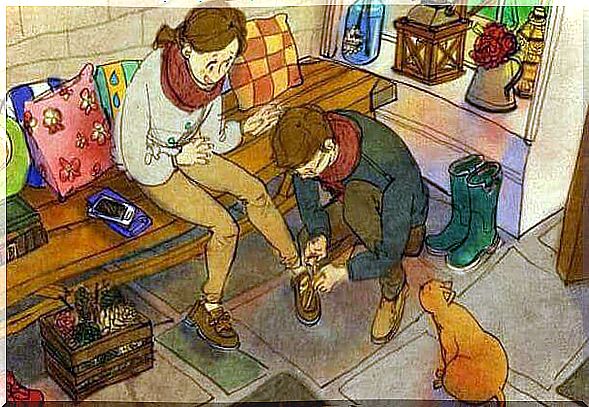To Treat Others With Affection Is To Touch Their Soul With Respect

Treating others with affection is the best sign of respect you can show them.
Such behavior rhymes with kindness, friendliness, respect and love. Indeed, what would be the point of not treating the people you love with affection? The answer is simple: nil.
However, this assertion, very often, is not in agreement with reality; we tend to easily forget the importance of treating others with delicacy, of laying our emotional hands on them, and of dedicating actions and loving words to them on a daily basis.
Bad answers, lack of respect, impertinence, cries, demands … Surely each of these reactions are too present in our relationships, as well as in our way of communicating with others.

How to connect emotionally
A word, a question, a gesture, a glance, a touch… Any expression constitutes a temptation of emotional connection with which one comes to say to the other “I want to feel connected to you”.
From there, we will receive a positive or negative response to our concern.
If we take the time to think about it, the frequency with which we ignore or give unpleasant responses to these connection attempts is overwhelming; hence the importance of learning to treat others with affection, to touch them with respect.
Thus, attempts at emotional connection would be much more successful if one knew how to identify the emotional needs of others.
There are many arguments that arise from misinterpretations as well as the feeling of disconnection that can be avoided with a discussion.
If we do not communicate with others while respecting them, our relationships with them end up withering and deteriorating; discussions that lead to nothing, empty gestures of affection, arguments, lack of empathy, etc. When we forget the importance of connecting with others, we usually cause our own isolation, our own dissatisfaction, and our own instability.

Responses to attempts at emotional connection
Complete and satisfactory relationships are not achieved overnight, but need to develop little by little through multiple gestures that forge stability and tenderness in our patterns of exchange with others.
We say that every day and with every little gesture, we lay the bricks of our castle, and that, of course, these exchanges constitute the pillars of the emotional information that feeds our affect.
Positive responses lead to a continuous and healthy discussion. They are the masterpiece of a ping pong game where the participants play with pleasure.
However, negative responses void any connection attempt. In other words, if one throws the ball and the other does not move his racket, the game ends.

In summary, there are different options available to us when responding to connection attempts. Depending on their nature, the ping pong game will be shorter or longer.
Let’s see how we need to respond to a gesture from others:
- Respond to the other with empathy towards them: for example, when one person makes a funny comment and the other laughs. If we foster this type of connection, we will obtain as a reward lasting relationships full of good feelings.
- Responding to the other with hostility: For example, a hostile response to a phrase like “I would like to buy myself a car” could be: “With your salary, don’t even think about it”.
- Ignore the other: ignore the attitudes of the other, which obviously destroys our relationships.

Treating people you like with affection should not be an exception, but a rule. Often times, these details are overlooked and our relationship weakens, which deteriorates.
So, let’s pay attention to the answers we give to others on a daily basis. Let’s not let bad acts escalate, and treat attempts at emotional connection as they should, with respect and tolerance.
NOTE: If you want to know more about this, read authors like John Gottman or Deborah Tannen.









